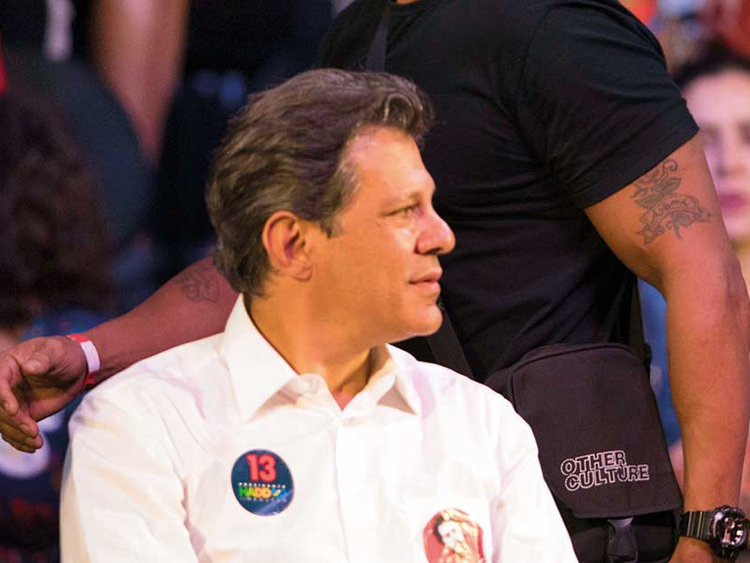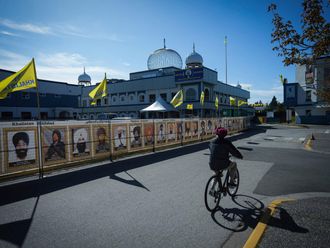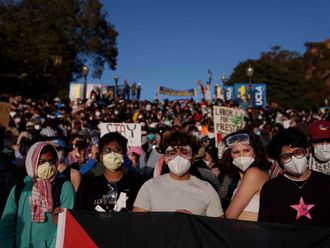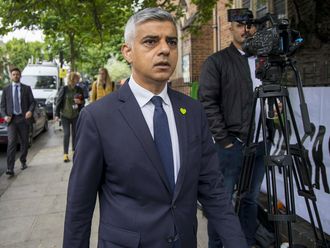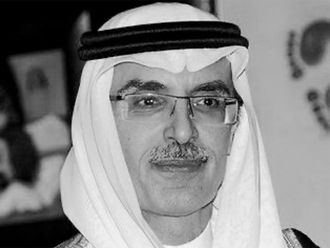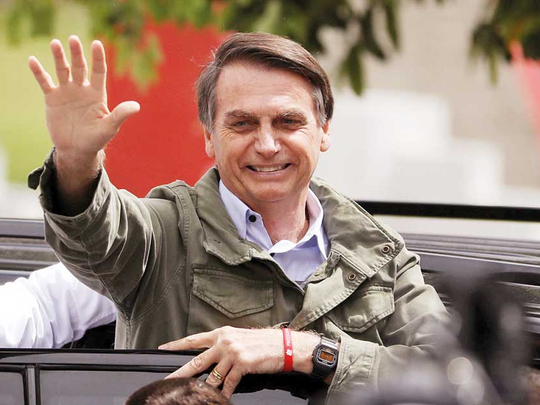
Haddad: Lula stand-in fighting far right
Fernando Haddad is the last hope for those dreading a far-right win in Brazil’s presidential election, but the measured university professor lacks the charisma of his mentor, ex-president Luiz Inacio Lula da Silva.
In an election that is largely about the one candidate who cannot run — the popular but imprisoned Lula, who is serving 12 years for corruption — Haddad, 55, has struggled to fill the shoes of his one-time boss, who led Brazil through the boom years of 2003 to 2010, before both the country and his left-wing political project went bust.
Brought in late in the game when it became clear the courts would not let the former president run, Haddad spent half the race selling himself as “Lula’s man,” and the other half doing the opposite.
Haddad launched his campaign in front of the prison where Lula is being held, and the Lula brand initially helped the relative unknown — a former Sao Paulo mayor and education minister — tap into the ex-president’s broad popularity.
But after far-right ex-army captain Jair Bolsonaro nearly won the first-round election outright on October 7, Haddad changed his strategy for the run-off.
He cut Lula’s image from his campaign ads, ended his weekly visits to him in prison and switched out the red flag of their Workers Party for Brazilian green, yellow and blue.
More recently, he began emphasising what he says is Bolsonaro’s “fascism” and the threat he poses to democracy.
“My adversary foments violence, including a culture of rape,” Haddad told AFP in an interview, recalling an episode when Bolsonaro told a congresswoman she didn’t “deserve” to be raped by him.
Haddad insists the race is not a done deal, pointing to a narrowing gap in the polls.
Last week, opinion polls were giving Bolsonaro an 18-point lead. On Thursday, it was down to 12 points: 56 per cent to 44.
“Nobody thought I would even make it to a run-off,” Haddad said.
“I think we’ve done a great job in one month’s time.”
An academic with degrees in law, economics and philosophy, Haddad has little in common with Lula, a former metalworker who grew up dirt poor and broke into union organising and then politics by sheer force of personality.
Haddad is the son of a Lebanese shopkeeper and an education student, and came of age as a “political being,” steeped in public life since his university days, he told the daily El País two years ago.
Known for his laid-back manner, he has spent most of his political career in Lula’s shadow.
“Haddad only ever spoke if asked a question,” a long-time Lula ally once said.
Lula named Haddad minister of education — a post the president valued highly — in 2005.
In 2012, Lula’s backing helped him pull off an underdog victory to become mayor of Sao Paulo, Brazil’s economic capital.
But four years later, it all came crashing down.
Lula’s chosen successor, former president Dilma Rousseff, was impeached for mishandling public funds as the economy started to go bust. Two months after, in October 2016, Haddad suffered a humiliating defeat in his re-election bid, losing the mayoral race in the first round with 17 per cent of the vote. Many Workers Party figures started getting caught up in corruption scandals — including Lula, accused of masterminding the large-scale pilfering of state oil company Petrobras. Haddad has also faced accusations of corruption, relating to his 2012 mayoral campaign. He rejects them as a baseless political smear.
A keen guitar player, Haddad is married with two children.
His take on
ECONOMY: Haddad has put the suffering of Brazilians during a protracted recession at the centre of his campaign, blaming much of the downturn on President Michel Temer’s reforms, even though the economy began to tank while the previous Workers’ Party president was still in power. Much of his platform centers on reversing what Temer has done, including removing a government spending cap and scrapping a law that made labour rules more flexible and reduced benefits.
SOCIAL PROGRAMMES: Haddad has promised to put social and economic inclusion at the heart of his agenda, vowing to reduce the inequalities that have long pushed vast swaths of Brazilian society to the margins. He has promised to overhaul the education system, to expand the public health system and to significantly increase the allowance of a popular welfare program.
Bolsonaro: Brazil’s ‘Tropical Trump’
Sometimes called a “Tropical Trump” for his politically incorrect vitriol, Brazilian far-right presidential candidate and heavy favourite Jair Bolsonaro has successfully played to an electorate disgusted with politics as usual.
Bolsonaro, 63, has built an image as a political outsider ready to rough up the establishment — no small feat given that, unlike the US president, he is a longtime politician.
The seven-term congressman has few legislative initiatives to his record but, crucially, has not been caught up in the massive corruption scandals that have made Brazilians furious with the political class in recent years.
But he has made enemies with his intolerant comments directed at women, gays and blacks, while fondly recalling Brazil’s brutal military dictatorship (1964-1985), in which he served as an army captain.
“The dictatorship’s mistake,” he said two years ago, “was to torture and not kill” leftist dissidents and suspected sympathisers.
But Bolsonaro has promised that if elected he would govern “with authority, but not authoritarianism.”
Running against leftist Fernando Haddad, Bolsonaro has promised to relax gun-control laws so that “good people” can take justice into their own hands, in a country fed up with violent crime.
In an ironic twist of fate, he was himself stabbed in the stomach at a campaign rally in September, by an attacker who said God had sent him to kill Bolsonaro.
The front-runner spent three weeks in the hospital. But he did not let his injuries keep him off his beloved social media accounts, where he kept up his virulent campaign. He survived without long-term damage, but, citing doctors’ orders, has since refrained from campaign rallies and — to Haddad’s chagrin — debates.
Bolsonaro calls himself an admirer of Donald Trump, and has similarly tapped a deep national malaise — in Brazil’s case, one caused by crime, an ailing economy and the never-ending “Car Wash” corruption scandal that has stoked fury at the political class.
“He talks about ‘politicians’ as if he weren’t part of that world. He wants to come across as a strongman, a hardliner, who will fight corruption,” said Michael Mohallem, a law professor at the Getulio Vargas Foundation.
Bolsonaro has sealed the support of the business sector, as well as Brazil’s powerful “Beef, bullets and Bible” caucus — comprising the agribusiness lobby, security hardliners and Evangelical Christians.
He owes his business support mainly to his choice of top financial adviser: respected liberal economist Paulo Guedes, a graduate of the University of Chicago.
He earned the agro-lobby’s backing with vows to put agriculture before the environment — frightening environmentalists, who warn he would be disastrous for the Amazon rainforest.
Evangelicals meanwhile like his social conservatism — although some frown on the fact that Bolsonaro, a Catholic, has five children by three women.
Born in 1955 to a Catholic family with Italian roots, Bolsonaro served as a paratrooper in the military before starting his political career in 1988 as a Rio de Janeiro city councillor.
Two years later, he was elected to the lower house of Congress, where he has been since. He has ignited one explosive controversy after another with his misogynist and racist remarks. In 2003, he said a female lawmaker he opposed was “not worth raping.” In 2011, he told Playboy magazine he would rather his sons be killed in an accident than come out as gay.
In 2016, he dedicated his vote to impeach leftist former president Dilma Rousseff to the military officer who headed the torture unit where she was detained as a political prisoner during the dictatorship.
With piercing blue eyes, Bolsonaro was known for his physical strength in his army days — earning the nickname “Big Horse.”
Today, his most fervent supporters have given him another nickname, the “Myth” — an image only bolstered when he survived the stabbing attack last month. Bolsonaro has four sons — three of them politicians — and, in what he called a moment of “weakness,” a daughter.
HIS TAKE ON
CRIME: The centrepiece of Bolsonaro’s campaign has been his promise to reduce Brazil’s high crime rate. Latin America’s largest country is the world leader in total number of homicides. Last year, a record 63,880 people were slain. Many Brazilians live in daily fear of muggings and burglaries. Bolsonaro also wants to lower the age at which defendants can be tried as adults to 16.
ECONOMY: By his own admission, Bolsonaro doesn’t know much about economics, but his choice of an economist who studied at the University of Chicago as an adviser won over much of Brazil’s business community. He has promised to cut the size of the government, and to pursue pension reform that will likely cut at least some benefits. He also wants to privatise many state companies.


